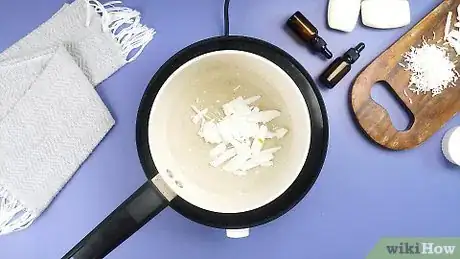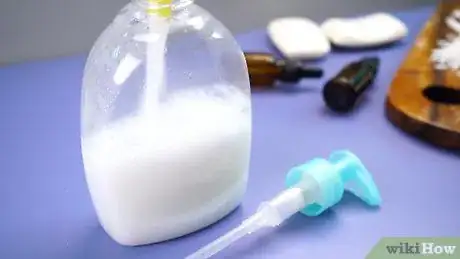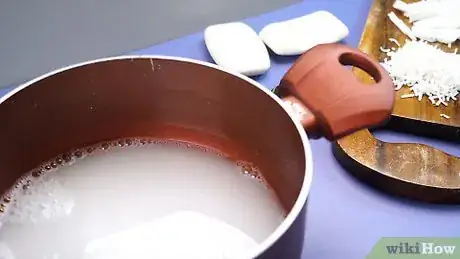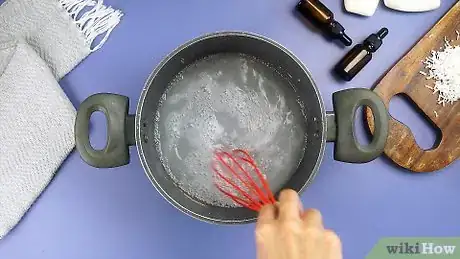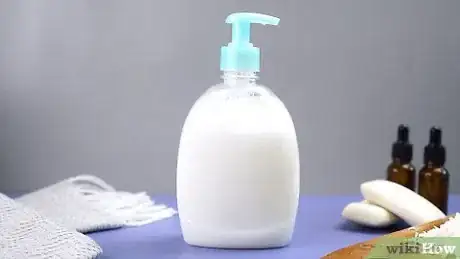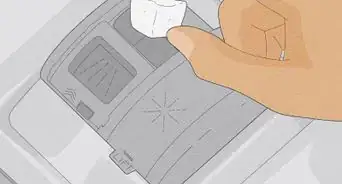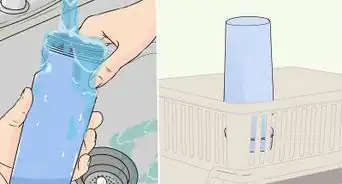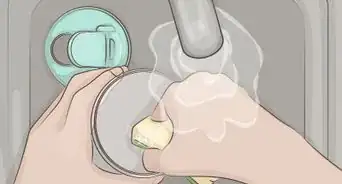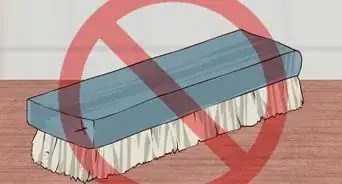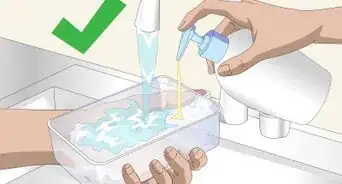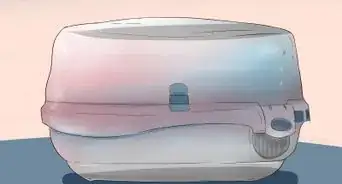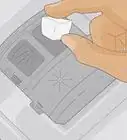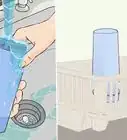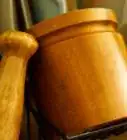This article was co-authored by Susan Stocker. Susan Stocker runs and owns Susan’s Green Cleaning, the #1 Green Cleaning Company in Seattle. She is well known in the region for outstanding customer service protocols — winning the 2017 Better Business Torch Award for Ethics & Integrity —and her energetic support of green cleaning practices.
This article has been viewed 219,475 times.
Not thrilled with the chemicals and unknown additives in commercially generated dish soap? You can make your own soap at home using natural ingredients that you may already have in your kitchen or laundry room. Make a basic version with just three ingredients, create a delicious smelling version with essential oils, or use the cleaning powerhouse Borax to make an extremely effective soap -- or try all three and see which works best for your needs.
Ingredients
Basic Liquid Dish Soap
- ¼ cup (9 g) soap flakes
- 2 cups (470 ml) water
- 1 to 2 tablespoons (15 to 30 ml) distilled white vinegar
Liquid Dish Soap with Essential Oil
- 1 ½ cups (353 ml) water
- ¼ cup (9 ml) grated castile bar soap, tightly packed
- ¼ cup (60 ml) liquid castile soap
- 2 ¼ teaspoon to 1 tablespoon (10 to14 g) super washing soda
- ½ teaspoon (1.5 g) glycerin
- 15 to 40 drops essential oil
Liquid Dish Soap with Borax
- 2 ½ cups (600 ml) water
- 1 tablespoon (2 g) Borax
- 1 tablespoon (14 g) washing soda
- 2 tablespoons (30 ml) white distilled vinegar
- ½ cup (120 ml) liquid castile soap
Steps
Traditional Liquid Dish Soap
-
1Combine the water and grated soap. Add 2 cups (470 ml) of water and ¼ cup (9 g) of soap flakes to a medium sauce pan. Use a spoon to stir the ingredients together so the soap is mixed throughout the water.[1]
- Soap flakes are usually sold in the laundry aisle at grocery stores.
- You can substitute soap shavings for store-bought flakes if you prefer.
-
2Heat the mixture until the soap melts. Place the saucepan with the water and soap on the stove. Allow the mixture to slowly heat on medium until the soap melts completely, which should take approximately 10 to 15 minutes. When all of the soap has melted, remove the pan from the stove and allow the mixture to cool for 5 to 10 minutes.[2]
- Do not allow the mixture to come to a boil on the stove. If it starts to boil, reduce the heat.
- Stirring the mixture as it heats can help the soap melt more quickly.
Advertisement -
3Mix in the vinegar. Once the soap and water mixture has cooled for several minutes, add 1 to 2 tablespoons (15 to 30 ml) of distilled white vinegar to the pan. Stir well to ensure that the vinegar is fully incorporated.[3]
- You can substitute fresh lemon juice for the vinegar if you prefer. Both will help cut grease when you’re washing dishes.
- The amount of vinegar you should add to the soap depends on how thick the mixture is. If it is extremely thick, add approximately 2 tablespoons (30 ml) to help loosen it up. If the soap mixture is already liquidy, just add approximately 1 tablespoon (15 ml).
-
4Cool the mixture completely before transferring to a soap dispenser. Allow the soap to sit in the pot until it is completely cooled, which may take 15 to 20 minutes. Next, pour the soap into a soap dispenser or pump bottle, and place beside your kitchen sink.[4]
- It’s often easier to transfer the soap from the pan to the dispenser with a funnel.
Liquid Dish Soap with Essential Oil
-
1Heat the water and grated soap until the soap melts. Add 1 ½ cups (353 ml) of water and ¼ cup (9 ml) of tightly packed, grated castile bar soap to a medium saucepan, and place on the stove. Turn the heat to medium-high, and allow the mixture to heat until the soap completely dissolves, which should take 5 to 10 minutes. Remove the pan from the stove.[5]
- Stir the mixture as it’s heating to help the soap dissolve more quickly.
-
2Add the liquid castile soap, some washing soda, and glycerin. Once the soap has dissolved completely and the mixture is off the heat, mix in ¼ cup (60 ml) of liquid castile soap, 2 ¼ teaspoons (10 g) of super washing soda, and ½ teaspoon (1.5 g) glycerin. Stir well until all of the ingredients are fully incorporated.[6]
- Washing soda is usually found in the laundry aisle of large grocery stores. If you can’t find it locally, you can order it from a variety of online stores.
EXPERT TIPRaymond Chiu is the Director of Operations for MaidSailors.com, a residential and commercial cleaning service based in New York City that provides home and office cleaning services at affordable prices. He has a Bachelors in Business Administration and Management from Baruch College.House Cleaning Professional
 Raymond Chiu
Raymond Chiu
House Cleaning ProfessionalFor a simple alternative, just mix boiling water, castile soap, and essential oil. Mix 1 1/2 cups of boiling water with 1/4 cup of grated bar castile soap. Then, add 1/4 cup of liquid soap. Mix the solution thoroughly, and use an eye dropper to add 25-50 drops of your favorite essential oil. Allow the solution to set for 24 hours, stirring occasionally to check the consistency. The solution will thicken a bit over time, so if you need to, add a little warm water into the mix to adjust it. Then, place the solution into a container with a pump and it will be ready to use!
-
3Allow the soap to set. Leave the soap mixture in the pan, and let it sit for 24 hours. Stir it periodically during this period to get a feel for the consistency. The soap will thicken up over time so it’s okay if it’s a bit runny. If it seems too thin, though, you can warm the soap up, mix in additional washing soda, and let it set again.[7]
- If you’re adding extra washing soda, start by mixing in ¾ teaspoon (3 g) and letting the soap sit again. If it’s still not thick enough, mix in the washing soda in ½ teaspoon increments (2 g) until it’s the right consistency.
- If your soap has chunks or lumps, smooth it with a blender or an immersion blender.
-
4Mix in the essential oils and transfer the soap to a soap dispenser. When the soap has reached your desired consistency, add 15 to 40 drops of your favorite essential oil. Stir well to ensure that the oil is blended throughout the soap for a fresh fragrance, and pour it into a soap dispenser for use beside the kitchen sink.[8]
- You can use any essential oil that you like, but citrus oils, such as lemon, lime, and orange, are particularly effective in cutting grease. Juniper and lavender are also good options.
Liquid Dish Soap with Borax
-
1Combine the Borax, washing soda, vinegar, and castile soap. In a large bowl, mix together 1 tablespoon (2 g) of Borax, 1 tablespoon (14 g) of washing soda, 2 tablespoons (30 ml) of white distilled vinegar, and ½ cup (120 ml) liquid castile soap. Stir well to ensure that all of the ingredients are well blended.[9]
- Borax is a natural mineral that’s ground down into a powder and used in cleaning products, such as dish soap and laundry detergent. You can find it with washing soda in the laundry aisle of most grocery markets.
- If you want your dish soap to have a scent, you can use a scented castile soap, such as lavender, peppermint, citrus, or tea tree.
-
2Boil the water and add the Borax mixture. Pour 2 ½ cups (600 ml) of water into a medium saucepan, and heat on the stove on high until it is boiling, which should take approximately 5 to 10 minutes. Remove the pan from the stove, and gradually pour the Borax mixture into the water, whisking after each addition to fully mix the soap.[10]
- If you want your soap to have a stronger scent, add 3 to 5 drops of your favorite essential oil, such as lavender or tea tree, and mix well.
- It’s okay if your soap is thin and liquidy. It will thicken up as it cools.
-
3Let the soap cool and transfer it to a soap dispenser. Allow the soap mixture to cool down to room temperature, which should take 20 to 30 minutes. Next, pour it into a dispenser and place it beside the kitchen sink.[11]EXPERT TIPSusan Stocker runs and owns Susan’s Green Cleaning, the #1 Green Cleaning Company in Seattle. She is well known in the region for outstanding customer service protocols — winning the 2017 Better Business Torch Award for Ethics & Integrity —and her energetic support of green cleaning practices.Green Cleaning Expert

 Susan Stocker
Susan Stocker
Green Cleaning ExpertAnother recipe uses Dr. Bronner's Sals Suds. Mix 1/3 cup of Sals Suds, 3/4 cup water, 1 tablespoon washing soda (which is different from baking soda), and ten drops of your favorite essential oil scent. Shake the ingredients well, and you have powerful dish soap. You can also use Sals Suds to make a floor or bathroom cleaner.
Community Q&A
-
QuestionWhat can I add to give my soap some color?
 Community AnswerYou can add some food coloring, but that may stain your hands and/or dishes. You can also try getting some soap-making dye either from an arts and crafts store, or from an online soap-making supply shop.
Community AnswerYou can add some food coloring, but that may stain your hands and/or dishes. You can also try getting some soap-making dye either from an arts and crafts store, or from an online soap-making supply shop. -
QuestionWhich type of bar soap can I use for the basic liquid soap?
 Community AnswerDove soap works well.
Community AnswerDove soap works well. -
QuestionThe water in my area is VERY hard. Castile soap binds with the minerals in the water, leaving behind a stubborn soap scum. Any substitute for the castile?
 Ellie HomewoodCommunity AnswerMany people boil vinegar, let it sit/scrub it and then put water on it. Scrub roughly, but don't scratch the surface.
Ellie HomewoodCommunity AnswerMany people boil vinegar, let it sit/scrub it and then put water on it. Scrub roughly, but don't scratch the surface.
Things You’ll Need
Basic Liquid Dish Soap
- A medium saucepan
- A spoon
- A soap dispenser bottle
Liquid Dish Soap with Essential Oil
- A medium saucepan
- A spoon
- A soap dispenser bottle
Liquid Dish Soap with Borax
- A large bowl
- A spoon
- A medium saucepan
- A whisk
- A soap dispenser bottle
References
- ↑ http://www.onegoodthingbyjillee.com/2012/09/how-to-make-your-own-dish-soap.html
- ↑ http://www.onegoodthingbyjillee.com/2012/09/how-to-make-your-own-dish-soap.html
- ↑ http://www.onegoodthingbyjillee.com/2012/09/how-to-make-your-own-dish-soap.html
- ↑ http://www.onegoodthingbyjillee.com/2012/09/how-to-make-your-own-dish-soap.html
- ↑ http://www.mommypotamus.com/homemade-liquid-dish-soap-recipe/
- ↑ http://www.mommypotamus.com/homemade-liquid-dish-soap-recipe/
- ↑ http://www.mommypotamus.com/homemade-liquid-dish-soap-recipe/
- ↑ http://www.mommypotamus.com/homemade-liquid-dish-soap-recipe/
- ↑ http://www.popsugar.com/smart-living/Homemade-Liquid-Dish-Soap-28764389
About This Article
Making your own liquid dish soap is a great way to avoid unnatural chemicals that are often used in commercial soap. All you need is water, distilled white vinegar, and soap flakes, which you can usually find in the laundry aisle of supermarkets. You can use fresh lemon juice instead of vinegar if you prefer. First, mix 2 cups of water and ¼ cup of soap flakes in a pan and heat it on medium. Stir the mixture while it heats for 10-15 minutes or until the soap melts. Remove the pan from the stove and let it cool for 5-10 minutes. Then, mix in 1 or 2 tablespoons of vinegar or lemon juice. Once your soap’s fully cooled, pour it into a soap dispenser or an old pump bottle. For more tips from our Cleaning co-author, including how to make liquid dish soap with essential oils, read on!
